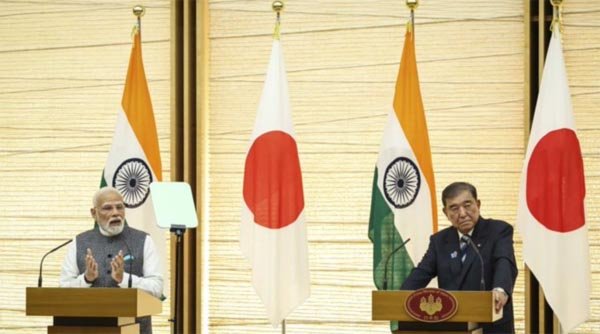New Delhi, Aug 30 (UNI) Prime Minister Narendra Modi has said his visit to Japan will be remembered for the productive outcomes which will benefit people of both the nations.
“I thank Prime Minister Ishiba, the Japanese people, and the Government for their warmth,” PM Modi wrote in a social media post after concluding his two-day visit.
The visit included the 15th India-Japan annual summit, a meeting with governors of 16 prefectures in Tokyo, and the India-Japan Economic Forum, where both Prime Ministers reaffirmed their shared vision of strengthening economic and strategic cooperation.
The visit began with a ceremonial welcome extended by Prime Minister Shigeru Ishiba, followed by delegation-level talks and a formal dinner in PM Modi’s honour. The camaraderie continued the next day as both leaders traveled together on the iconic Shinkansen bullet train from Tokyo to Sendai, shared a meal, and jointly visited the Tokyo Electron factory — symbolizing personal rapport and high-level commitment to collaboration.
The visit has paved the way for landmark outcomes that will shape the next decade of India-Japan relations. A highlight of the visit was Japan’s pledge of 10 trillion yen (over $68 billion) in private investment into India over the next ten years, an ambitious move set to reshape India’s economic landscape and deepen bilateral ties.
This commitment forms part of the India-Japan Joint Vision for the Next Decade, a strategic roadmap focusing on eight priority areas — economic partnership, economic security, mobility, sustainability, technology and innovation, health, people-to-people exchanges, and state-prefecture engagement.
A wide-ranging set of Memorandums of Understanding (MoUs) were signed, spanning cooperation in defence, digital innovation, clean energy, critical minerals, space exploration, cultural exchange, and human resource development. These landmark agreements mark a new phase in India-Japan relations, expanding the partnership into high-impact, future-focused sectors.
The talks gave birth to a joint declaration on security cooperation, which elevates the defence and security ties to the next level; and an action plan for India-Japan human resource exchange and cooperation. This lays out a roadmap for talent mobility and deepening people-to-people ties through exchanges of more than 500,000 personnel in five years, including 50,000 skilled personnel and potential talents from India to Japan.
The two Prime Ministers also announced India-Japan Economic Security Initiative to provide a momentum for bilateral cooperation in the field of economic security including securing and strengthening supply chains in critical goods and sectors and accelerating cooperation in critical and emerging technologies.
Another striking feature of the visit was the broad, bipartisan nature of India-Japan ties. Prime Minister Modi met two former Japanese Prime Ministers, Yoshihide Suga and Fumio Kishida, reflecting political continuity and sustained goodwill across party lines. He also engaged with the Speaker and a group of Japanese Members of Parliament.
The Prime Ministers also reaffirmed their commitment to UN Security Council reform, supporting expansion in both permanent and non-permanent seats to reflect contemporary geopolitical realities. They backed each other’s bids for permanent membership and stressed the need for broader reforms in the UN system.
The 15th annual summit helped take stock of progress under the India-Japan Special Strategic and Global Partnership since 2014 and laid the foundation for deeper collaboration ahead of the 75th anniversary of diplomatic ties in 2027.











